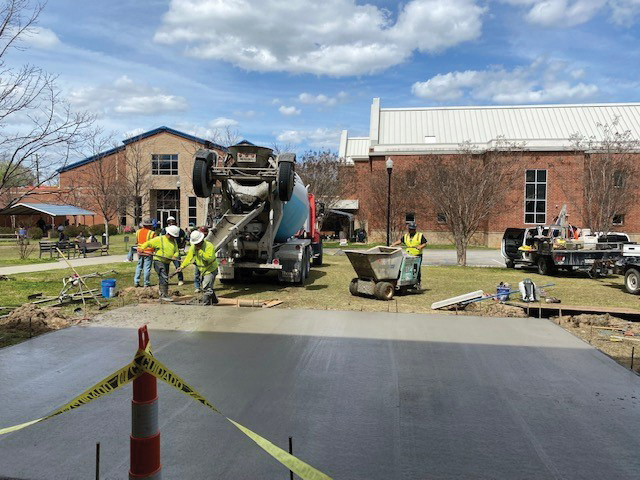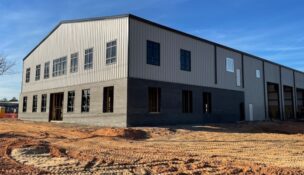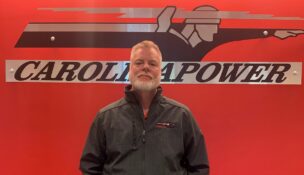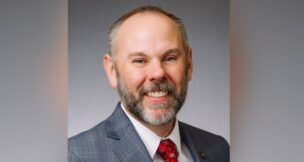Improvements brighten surroundings, experiences at Transitions
Melinda Waldrop //April 27, 2022//
The small concrete slab that will serve as a basketball court may not seem like much, but Craig Currey has been coveting it for a decade.
The recently poured concrete is part of the improvements made to Transitions Homeless Center by the 2022 class of Leadership Columbia, an annual community outreach program through the Columbia Chamber of Commerce.
“I’ve been trying to get that basketball pad for 10 years,” said Currey, CEO of Transitions.
 The downtown homeless shelter at 2025 Main St. serves clients referred from partnering agencies in Richland, Lexington, Fairfield, Chester, Lancaster, Newberry, York, Calhoun, Orangeburg, Bamberg, Allendale, Barnwell and Aiken counties. It has applied for several years to be chosen as the leadership development program’s collaborative class project — seven to be exact, said Currey — but hadn’t made the cut until this year.
The downtown homeless shelter at 2025 Main St. serves clients referred from partnering agencies in Richland, Lexington, Fairfield, Chester, Lancaster, Newberry, York, Calhoun, Orangeburg, Bamberg, Allendale, Barnwell and Aiken counties. It has applied for several years to be chosen as the leadership development program’s collaborative class project — seven to be exact, said Currey — but hadn’t made the cut until this year.
“We were very happy. It is work to apply for this,” Currey said. “You have to explain what you want. You have to come up with a valid project that they want to do. I had a staff member in the past who would each year beg me not to do this, because she was doing the work and she felt we were not going to get picked. She’s gone now, but I knew eventually we’d get picked, and this really has been very helpful.”
The Leadership Columbia class has also pressure-washed buildings on the Transitions campus, spruced up flower beds in its courtyard and repainted its day center and adult day care areas. But it’s the soon-to-be-court, which has yet to have a basketball goal installed, that truly signifies the progress for Currey.
“I’ve been trying get that basketball pad for 10 years,” he said. “I had different groups lined up to do it. COVID wiped out the last group” which decided to focus on pandemic-related relief efforts.
Since its 2011 opening, Transitions has helped move more than 3,207 people into permanent housing, served more than 2,178,600 meals from its on-site kitchen, and formed area partnerships with more than 55 community organizations. Its services stretch beyond clients, as its adult day care facility, which provides five hours of care a day, is open to the community at large.
Transition clients also have access to job training and skills programs, mental health and addiction counselors, a clothing closet and a health clinic. Leadership Columbia is helping add resources to the career office and is planning to add entertainment options to the adult day care room, while a partnership with ColaTown Bike Collective is helping procure bicycles — the primary form of transportation for many clients — along with locks and helmets.
“It’s a one-stop shop,” Currey said. “The goal is that if somebody comes here, they don’t have to go all over the city.”
Nic Collins, Leadership Columbia project lead, has volunteered at Transitions for three years.
“It’s really neat to see other people from my community get involved and have the same passion for the place as I’ve had for a while. It’s been really rewarding,” he said.
Volunteering at Transitions has helped him realize that its clients are “regular human beings like the rest of us,” said Collins, whose day job is selling pipe valves and fittings with Wolseley Industrial Group. “I think sometimes outside these walls we forget that, and so it’s been very rewarding and very encouraging to have our entire class be in here and be comfortable and be able to share those stories with their friends and family and community members.”
Meg Syms, marketing manager at Garvin Design Group, is also a member of Leadership Columbia’s 2022 class. She said working with Transitions has had many memorable moments, including the $800 raised through social media in two weeks, a total that equated to about $14 per donor.
“We’re going to be able to take care of a lot of things that were on their wish list,” Syms said. “This was a dream come true to selected for the class project and then to watch it unfold so quickly and have things happen in such a short period of time, I think, for them, has been really cool.”
The help comes at an especially critical time, as Transitions clients are still navigating the lingering effects of the COVID-19 pandemic — including rising inflation that has driven up the cost of everyday living.
“Our workers still make the same amount of money, but the rents have gone way higher. Food has gone way higher. So what they need to live a month has gone higher,” Currey said. “Initially, (the pandemic) really hurt, because the hospitality industry was shut down. A lot of our folks can get jobs in the food service industry. So that initially hurt us, but now they’re back in full swing, and so they’ve hired and our people are back working there. We have a lot of folks who do cleaning, we have people at call centers. We have people all over the place working in different jobs. We obviously want to get the best-paying job that we can get for them so they can break the cycle and move out of poverty and homelessness.
“A lot of folks need part-time jobs. Some have disabilities but they can manage a part-time job that’s limited physically. We’re always looking for those kinds of jobs.”
Currey said Transitions never turned away any clients during the pandemic, but adhering to stringent social distancing guidelines forced creative solutions such as to-go boxes for all meals and wall-hung tablets for clients to communicate with caseworkers.
Clients also spent more time outside, where they made use of refurbished beds now bursting with rosemary and grapevines. “That just looks better,” Currey said. “If the place looks better, that makes the clients happier.”
Across the courtyard path, Currey envisions groups soon engaged in a spirted game of hoops — maybe with a few famous participants.
“This gives the clients some physical activity,” said Currey, who has seen similar initiatives get remarkable results at the Chapman Partnership in Miami, where players from the Miami Heat, including LeBron James when his NBA career took him to South Florida, would occasionally show up.
“The clients would just go berserk,” Currey said. “I’m thinking if we ever get this built here, maybe we’ll get the women’s basketball team or somebody to come over and do a demonstration.”
This article first appeared in the April 25 print edition of the Columbia Regional Business Report.
l















